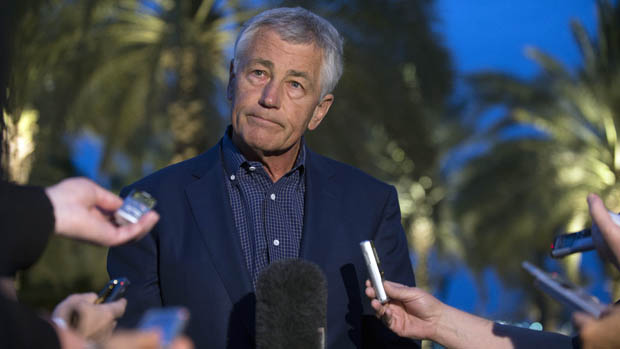US says Syrian regime has used chemical weapons twice
Assad crosses Obama's 'red line' by using sarin gas, but president moving 'cautiously' to intervene

A free daily email with the biggest news stories of the day – and the best features from TheWeek.com
You are now subscribed
Your newsletter sign-up was successful
THE US is moving "cautiously" towards military intervention in Syria's bloody civil war following the revelation that the Assad regime has almost certainly used chemical weapons against the rebels.
While there have been reports about the regime using chemical weapons in Syria for some time, says the National Review Online, there now appears to be a "consensus that the Assad government has used them".
US intelligence has concluded "with some confidence" that the weapons – most likely sarin gas – have been employed in a series of small scale attacks in recent months. The conclusion is based on "physiological evidence" as well as eyewitness reports.
The Week
Escape your echo chamber. Get the facts behind the news, plus analysis from multiple perspectives.

Sign up for The Week's Free Newsletters
From our morning news briefing to a weekly Good News Newsletter, get the best of The Week delivered directly to your inbox.
From our morning news briefing to a weekly Good News Newsletter, get the best of The Week delivered directly to your inbox.
Speaking in Abu Dhabi yesterday, Chuck Hagel (pictured), the US Secretary of Defense, said the conclusion had been reached in "the past 24 hours". He added that the use of sarin gas "violates every convention of warfare".
His statement was backed up several hours later by US Secretary of State John Kerry, who said chemical weapons were believed to have been used by the regime in two separate attacks.
The US's hardening conviction that chemical weapons have been used is hugely significant because President Obama has described the issue variously as a "game changer" and a "red line" for America. If the Syrian regime crossed that line, he warned, it would "change the equation" regarding the possibility of US intervention.
Yesterday, Republicans in the US Congress insisted the 'red line' had been crossed and warned that if there is no retribution from the West the regime will be "emboldened".
A free daily email with the biggest news stories of the day – and the best features from TheWeek.com
But Obama doesn't want to go to war in Syria, says the BBC's Mark Mardell. He regards it as "too complex, too difficult, too uncertain".
Mardell writes: "American military action there would have a huge impact on the perception of America in the region - confirming every image he wants to change. Yet the US is, perhaps, moving slowly and cautiously toward taking action. There is no sense of a time scale and no real certainty about what might be done."
Asked about the issue today, David Cameron said there is "limited but growing" evidence that the Syrian government has used chemical weapons. The PM called the evidence "very disturbing", adding that it would constitute a war crime.
British intelligence has been convinced for some time that the Assad regime has used chemical weapons. A Foreign Office spokesperson told The Guardian: "We have limited but persuasive information from various sources showing chemical weapon use in Syria, including sarin. This is extremely concerning. Use of chemical weapons is a war crime. We have briefed our allies, partners and the UN on this information and we are working actively to get more and better information."
-
 6 of the world’s most accessible destinations
6 of the world’s most accessible destinationsThe Week Recommends Experience all of Berlin, Singapore and Sydney
-
 How the FCC’s ‘equal time’ rule works
How the FCC’s ‘equal time’ rule worksIn the Spotlight The law is at the heart of the Colbert-CBS conflict
-
 What is the endgame in the DHS shutdown?
What is the endgame in the DHS shutdown?Today’s Big Question Democrats want to rein in ICE’s immigration crackdown
-
 Epstein files topple law CEO, roil UK government
Epstein files topple law CEO, roil UK governmentSpeed Read Peter Mandelson, Britain’s former ambassador to the US, is caught up in the scandal
-
 Iran and US prepare to meet after skirmishes
Iran and US prepare to meet after skirmishesSpeed Read The incident comes amid heightened tensions in the Middle East
-
 Syria’s Kurds: abandoned by their US ally
Syria’s Kurds: abandoned by their US allyTalking Point Ahmed al-Sharaa’s lightning offensive against Syrian Kurdistan belies his promise to respect the country’s ethnic minorities
-
 Israel retrieves final hostage’s body from Gaza
Israel retrieves final hostage’s body from GazaSpeed Read The 24-year-old police officer was killed during the initial Hamas attack
-
 China’s Xi targets top general in growing purge
China’s Xi targets top general in growing purgeSpeed Read Zhang Youxia is being investigated over ‘grave violations’ of the law
-
 Syria’s Islamic State problem
Syria’s Islamic State problemIn The Spotlight Fragile security in prison camps leads to escape of IS fighters
-
 Panama and Canada are negotiating over a crucial copper mine
Panama and Canada are negotiating over a crucial copper mineIn the Spotlight Panama is set to make a final decision on the mine this summer
-
 Why Greenland’s natural resources are nearly impossible to mine
Why Greenland’s natural resources are nearly impossible to mineThe Explainer The country’s natural landscape makes the task extremely difficult